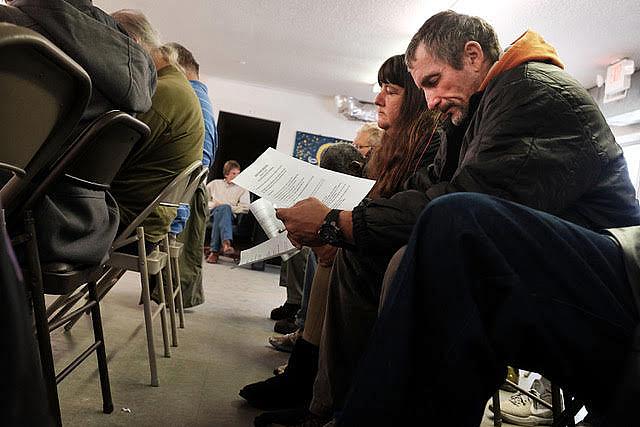Perspective: Push for Medicaid work requirements shows a lack of compassion for those most in need

Men and women participate in a church service before a meal for those in need in Biloxi, Mississippi. The state is currently seeking federal approval to add work requirements to its Medicaid program. (Photo by Spencer Platt/Getty Images)
The idea of instituting Medicaid work requirements has been around for decades, but the Trump administration is the first to issue new rules allowing states to implement them. The idea has always been rooted in the notion that people are getting away with something — they’re freeloading. Proponents of a work requirement think it would flush these people out of the system. But the reality is that such a requirement is unnecessary. That’s because most people on Medicaid already work.
A 2017 study by the Kaiser Family Foundation found that six in 10 non-disabled adults on Medicaid already work at least part time, but they work in jobs that do not provide health benefits. Most of those who weren’t working were either in school, dealing with an illness, or caring for a loved one; they had a legitimate barrier to being able to work. The new rules will allow some exceptions for such things, but what kind of hoops will people have to go through to prove they meet the criteria? What if the Medicaid recipient is too sick to work, but doesn’t have a disability designation? Health care advocates say others might be providing uncompensated care for loved ones. How will they document that? Get ready for an administrative nightmare that could be a life-and-death struggle for people in need.
The Trump administration has proposed a system that is certain to raise costs. First, states that get a waiver from the federal government to impose Medicaid work requirements will need a team to make sure recipients are working. They’ll need even more workers to process the requests for an exemption. Those who are thrown off Medicaid will have no health care choice but an ER, and we know that is the least efficient and costliest place to get care.
The work requirement may seem a fair request to many of our fellow citizens. The bar for Medicaid eligibility is fairly low, primarily based on income. In states that expanded Medicaid through the Affordable Care Act, that equates to $16,643 per year for an individual and $33,948 for a family of four. So, some may point to earning more as a potential solution. However, the cost of health insurance is still out of reach if people are stuck in low-paying jobs or if their employer doesn’t offer health coverage. What a catch-22 situation. No wonder there is a basic question of fairness at the heart of the controversy over work requirements.
The real underlying issue is growing income inequality and the lack of decent paying jobs with benefits. That’s what has led 23 percent of the U.S. population to rely on Medicaid, a program intended for those living and working in poverty. Diverting the money spent rolling out work requirements into opportunities for people to lift themselves out of poverty and into jobs that provide employer-based insurance will be more fruitful in the long run.
Booting poor people off the Medicaid rolls without providing them any employment assistance is a cruel prospect. The work requirement would harm those in the greatest need of help. Nonetheless, at least nine more states are currently considering the waiver to implement a Medicaid work requirement. The Center for American Progress estimates 640,000 people could lose coverage in those states alone. California is not among the states considering Medicaid work requirements, as the leaders here seem to understand the basic tenet of Medicaid — to provide access to health care for the most vulnerable.
When President Lyndon Johnson signed the law that created Medicaid in 1965, he promised it would help "improve a wide range of health and medical services for Americans of all ages." He also credited Harry Truman for “planting the seeds of compassion and duty which have today flowered into care for the sick and serenity for the fearful.” The Affordable Care Act spread that compassion further by allowing states to expand Medicaid eligibility in 2014 to individuals under age 65 in families with incomes below 133 percent of the federal poverty level. What happened to that compassion?
The new Medicaid work requirement rules will undoubtedly hurt people in the states that choose to obtain a waiver, but other states should brace for more attacks on the system. Even before the work requirement rules were announced, Republicans in Washington had been trying to slash Medicaid funding via block grants, and they have vowed to take aim on federal health care costs again this year. The vulnerable can only hope that lawmakers take another look at the research and come to their senses.
**

